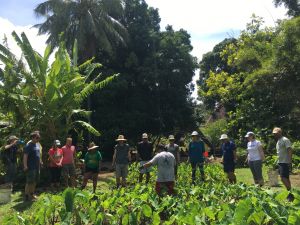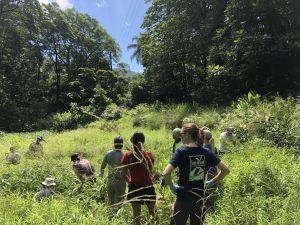

Updated guidance on best practices for community-embedded research in Hawaiʻi
November 1, 2021
A groundbreaking publication that seeks to build more just and generative relationships between researchers and community members was recently updated to better reflect the nuances and complexities of community-researcher partnerships.
Kūlana Noi‘i was initially developed in 2017 through a partnership between university researchers and place-based stewards to ensure equitable and reciprocal relationships with those connected to, and caring for, the ahupuaʻa of Heʻeia. It outlined a set of ideas, values, and behaviors that served as a resource to facilitate open conversation and clearly articulated expectations.
Hundreds of research projects are conducted each year focused on Hawai‘i’s upland, coastal, and marine ecosystems, and these natural resources are integral to the livelihoods, cultural practices, and religious traditions of the surrounding community. Kūlana Noi‘i arose from a practical need to establish non-extractive research partnerships and provide best practices to conduct place-based research in Indigenous spaces with a focus on Hawaiʻi.
Kūlana Noiʻi version 2.0 includes an enhanced introduction with guidance on using the publication as a starting point to spark deeper conversations. It also includes updates to each of the kūlana to reflect lessons learned in previous/ongoing partnerships.
Since Kūlana Noiʻi was first released, over 600 researchers, community members, and resource stewards have been trained through more than 40 workshops on building and nurturing pilina (relationships) and A‘o aku, a‘o mai / Aloha aku, aloha mai (knowledge given, knowledge received / Love given, love received. It has also had far-reaching impacts beyond Hawaiʻi, and has been shared nationally through peer-reviewed journal articles, the NOAA Sea Grant Traditional and Local Knowledge vision document, the Climate Adaptation Knowledge Exchange website, as a resource in creating the Arctic Science Summit Week 2021 Code of Conduct, and more.
Dr. Rosie Alegado, director of Hawai‘i Sea Grant’s Center for Integrated Knowledge Systems, noted “This guidance document also has resonance for other academic institutions that strive to center justice and equity in their work.”
Next, the Kūlana Noiʻi Working Group intends to focus on developing additional curricula to train STEM faculty and graduate students in this process. “A key starting point for University of Hawai‘i becoming a Native Hawaiian place of learning is for our researchers to adopt a praxis of working in partnership and active engagement with local communities,” said Dr. Alegado.
Although Kūlana Noiʻi was initially envisioned through partnerships among the University of Hawai‘i Sea Grant College Program, Kuaʻāina Ulu ʻAuamo (KUA), the Hawaiian Islands Sentinel Site Cooperative, and the He‘eia National Estuarine Research Reserve, importantly, it does not belong to any single organization, institution, or community. It is rooted in the collective knowledge, insight, and many years of effort contributed by communities, organizations, and experts across Hawai‘i.
To learn more about Kūlana Noiʻi and the other projects featured in Hawai‘i Sea Grant’s Center for Integrated Knowledge Systems, visit: https://seagrant.soest.hawaii.edu/integrated-knowledge-systems/
The University of Hawaiʻi Sea Grant College Program is part of the University of Hawai‘i at Mānoa’s prestigious School of Ocean and Earth Science and Technology. It supports an innovative program of research, education and extension services directed to the improved understanding and stewardship of coastal and marine resources of the state, region and nation. Science serving Hawai‘i and the Pacific since 1968.

